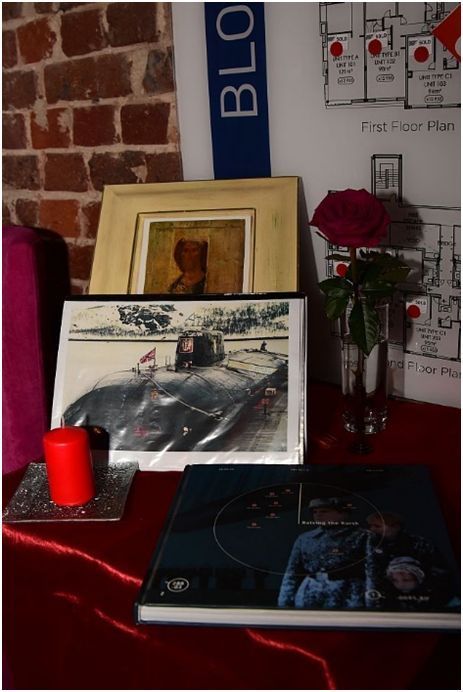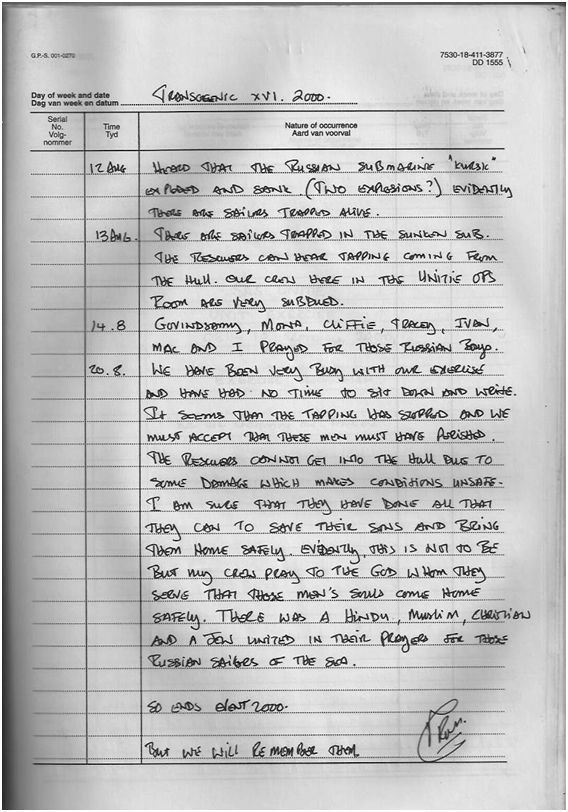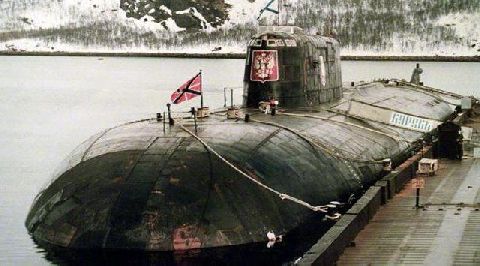

 The South African
The South African
By Lt Cdr Glenn von Zeil, SA Naval Reserves
20 YEARS ON “WE STILL REMEMBER THEM”
CAPE TOWN REMEMBERS
THE RUSSIAN SUBMARINE KURSK
On the 12 August 2020, the 20th anniversary of the tragic sinking of the Russian APL (Nuclear powered submarine) K-141 was commemorated by a small function hosted by the Russian Club in collaboration with the Russian Consulate General in Cape Town.
The event took place in the historic old Royal Naval bakery opposite SAS SIMONSBERG gate. The evening took the form of lighting a memorial candle, Kursk memorial poem and viewing three documentaries, including a roll of honour, on the Kursk submarine.
Thereafter ex-SA Navy Diver André van Heerden recounted the role that he played as a salvage diver in retrieving the bodies of the Russian sailors. He was commended and honoured for his work afterwards by Andrei Zvyagincev, leader of the Russian Diving Rescue Operation, who presented him with a book on salvage diving. Zvyagincev received the Golden Star Decoration of the Hero of Russia for the operation.

Memorial candle, book and photograph at the commemoration
Zvyagincev was interviewed on the documentary “The bitter truth about had explosion on the Kursk submarine” where he shared his experience.
Lt Cdr (Ret) Robin Cross recalled how the SAS UNITIE Naval Control and Guidance of the Shipping (NCAGS) team on duty at the time first heard of the Kursk’s sinking in 2000. A “118 seconds” silence is held annually during each NCAGS exercise to remember the 118 Russian sailors who lost their lives.
“In South Africa, the NCAGS component of the S A Navy were undergoing a two-week NCAGS Exercise. Here is where all units participating applied their training and honed their disciplines to that end.
These men and women were Naval Volunteers and all the training was done in their spare time or ‘after normal working hours’. All merchant ships may sail wherever they are sent but, in wartime, they may only sail under the direction and discretion of the Navy. In the territorial waters of friendly countries, the water-ways and routes have to be protected and the NCAGS organisation has been put in place to provide that protection and guidance.
It was during one of these exercises in the year 2000 that the disaster occurred and, being in the Operations Room, the NCAGS Officer picked up overseas broadcasts from England, Denmark and Norway that explosions had been recorded as seismic activity. Thinking nothing of it at that time, he carried on with the signal traffic that demanded his attention. It was about three hours later that the noises were identified as being explosions originating in the Barents Sea and, judging from Russian Naval radio traffic, it was assumed that a submarine had been sunk. That was when the NCAGSO informed his personnel that fellow sailors might have perished in an awful accident.
They realised that Russia had
an “Event 2000”
(Sub miss, sub sunk).
It was 24 hours later that they learned that tapping had been heard from the stricken submarine now lying about 200 meters on the bottom of the sea. From what could be understood, again assumed, some submariners had managed to get into the rear compartment (compartment 9) of the vessel and were tapping messages on the ship’s hull. This brought new hope that these men could be rescued. Christian, Moslem and Jew prayed, united in the hope that their naval comrades might be rescued.
As the days went by, that hope dimmed. Eventually, all hope was lost, based on the reports from Norway.”
-------------------------------------------
“In 2003, the NCAGS team were once again exercising their skills, writing signals and visiting ships. It was the 12 August and the KURSK Silence had been observed by the team. Later that evening, I as the Boarding Officer and a Leading Hand (L/S (Mrs) Mymona Wentzel) visited the MSC SUEZ at berth in the container basin.
After completing the ‘Naval business’ with the Master and Chief Officer, I noticed that the crew-list had only Russian names on it. I shared the events of that day two years previously and recounted the prayers for their countrymen. Immediately the Master’s right hand came over his heart as a sign of reverence. The Chief Officer did likewise. For that instant, the Master, the Chief Officer, a Leading Swan and I, were united as sailors, those men and women who go down to the sea in ships.
After requesting the Captain’s permission to go ashore the Chief Officer escorted us to the boat deck. On the way there we heard the Master speaking to the crew on the ship’s intercom system. When we reached the prow, it was lined by the crew in two rows.
There was silence as we passed between them. The L/Swan turned and saluted to pay her respects to the ship’s flag and began her descent to the dock. I turned and saluted likewise. The ship’s company came to attention, as one man, the Chief Officer returned the salute.
As I went down to the dock, he heard one man saying in English: “We remember the KURSK too!”
There will be more accidents and more sailors lost in navies of the world. With each and every event, in war or peace, lessons are learned.
The lesson that I learned that night is that there is a common factor binds men and women together -compassion for the fallen, especially for those lost at sea.”
Lt Cdr D (Ret) Robin Cross, JCD
12 August 2020
-------------------------------------------
There are many instances where South Africa and Russia share histories through mutual support. These include amongst others:
The Russian Consulate and Russian Club will continue to host an annual commemoration event for the Kursk and celebrate mutual historical events.
Should you wish to access the three documentaries these are available at:
http://youtube.be/ZAZHnRM8gUg (Kursk Roll of Honour)
http://youtube.be/PHm9tWdbXHc (the bitter truth about the Kursk submarine)
http://youtube.be/y53SFiPsjEo (For the first time, Putin reveals how he salvaged the Kursk submarine)
-------------------------------------------
Transcript of ship’s log:
TRANSOCEANIC XVI.2000
12 Aug Heard that the Russian submarine “Kursk” exploded and sank (two explosions?) evidently there are sailors alive.
13 Aug There are sailors trapped in the sunken sub. The rescuers can hear tapping coming from the hull. Our crew here in the Unitie OPS room are very subdued.
14.8 Govindsamy, Mona, Cliffie, Tracey, Ivan, Mac and I prayed for those Russian boys.
20.8 We have been very busy with our exercise and have had no time to sit down and write. It seems that the tapping has stopped and we must accept that these men must have perished. The rescuers cannot get into the hull due to some damage which makes conditions unsafe. I am sure that they have done all that they can to save their sons and bring them home safely. Evidently, this is not to be but my crew pray to the God whom they serve that those men’s souls come home safely. There was a Hindu, Muslim, Christian and Jew united in their prayers too for those Russian sailors of the sea.
So ends (illegible) 2000
But we will remember them

Page of the log
-------------------------------------------
11 - 22 August 2003 Oceanic XVIII
On Monday 12th Lt Cdr Cross and A.B Wentzel proceeded on ship's visit to MSC Suez, TMC LI The whole crew was Russian.
After completing the relevant ship's Data Card and Format Bravo, Lt Cdr Cross chatted with Capt Sigel and made mention of the Kursk submarine that went down off North Cape 12 August 2000. The Captain's hand came up to over his head [sic] as a sign of reverence (it must have hit his heart or had an impact on his life in some way besides that it was fellow countrymen). Cdr Cross mentioned that we as NCAGS team remember, and have a moment's silence in memory of the 118 Russian sailors that died in that awful time.
The interview / brief done, the Cdr and AB proceeded ashore. As they were proceeding down in the lift with the chief officer there was a broadcast on the piping system which they did not understand but the Chief Officer was smiling when they reached the prow the WHOLE (sic) crew was lined up to bid them farewell.
On saluting the quarterdeck as per naval tradition the whole crew saluted back in unison. Evidently the crew must be Russian or ex-Russian military / navy. Something awesome to behold.
As we went down the plank a Russian sailor called down to us and said in English "We remember Kursk too!"
Vessel: MV MSC SUE 8 (Ex HAMBURG SENATOR)
IRCS: ELPSS
MASTER: CAPT VITALY SIGEL BORN
2/6/1940 MOSCOW

The Russian submarine Kursk before the tragedy
Return to Journal Index OR Society's Home page
South African Military History Society / scribe@samilitaryhistory.org